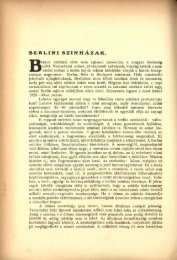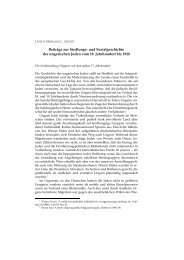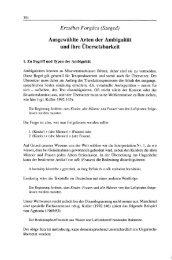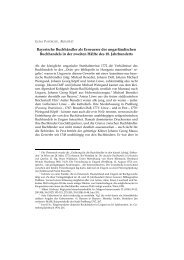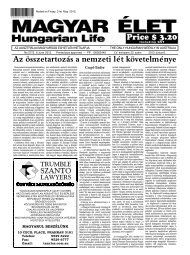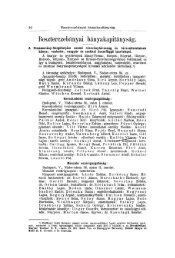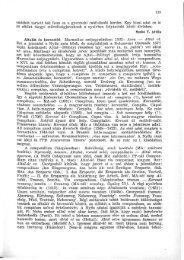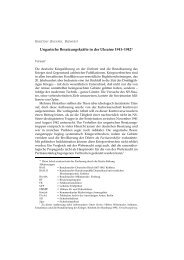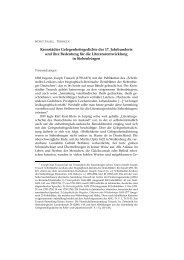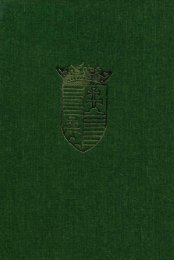hungarian studies - EPA - Országos Széchényi Könyvtár
hungarian studies - EPA - Országos Széchényi Könyvtár
hungarian studies - EPA - Országos Széchényi Könyvtár
Create successful ePaper yourself
Turn your PDF publications into a flip-book with our unique Google optimized e-Paper software.
REVIEWS 143<br />
This sounds rather like kitsch, if not a parody of kitsch, which I fear it isn't. It would be<br />
difficult enough for me to accept such diction in a twentieth-century English or American<br />
short story, but when I find myself reading it in the form of a translation from the Hungarian,<br />
a language which bears not the slightest resemblance to English, I become even more painfully<br />
conscious of the dated melodramatic quality of the English. As English "dubbing" of Hungarian<br />
dialogue, it thus sounds, in my ears, even more embarrassing than it otherwise might. That<br />
"foreigners" should be made to mouth such English does make me wonder what Ady sounds<br />
like in Hungarian. I suspect that, working within Hungarian stylistic traditions with which I am<br />
necessarily unfamiliar, he simply cannot be "Englished" without his threatening sometimes to<br />
sound as if he were writing kitsch.<br />
At other times one stumbles over the odd phrase which causes one to ponder what sort of<br />
technical term the English is doing duty for, as when the narrator remarks, "the gentlemen of<br />
the theatrical board liked their chorus girls to be gay" (p. 7). I am not all sure what a theatrical<br />
board is, much less its Hungarian equivalent, but the theatrical collocation "to troop the boards"<br />
from somewhere in the wings totally inappropriately calls out. And as soon as the talk is of<br />
"chorus girls" I, in my provincial fashion, think of Broadway of the 1930s and vintage New<br />
Yorker cartoons and old Hollywood musicals. It may very well be that "chorus girls" is a<br />
precise, entirely accurate translation. That there might be such a thing as an Hungarian chorus<br />
girl is a proposition I am not unwilling to accept, even ifit does not match up with any of my<br />
limited range of stereotypical images of "Hungarians". Hungarian chorus girls must therefore<br />
in my reading process first shed all sorts of inappropriate non-Hungarian contexts which,<br />
without my willing them to do so, and certainly no fault of Ady or his translator much less<br />
Hungarian chorus girls, invade my reading consciousness.<br />
Reading the anthology I sometimes find myself in something of a no man's land, between<br />
"my" Anglo-American "English" world, summoned up whether I like it or not by immediate<br />
stock responses to the language formulations of the translated text, and the Hungarian world<br />
which the English text is standing in for. This peculiar in-between world in which 1 find myself,<br />
a world in which theatrical boards exist, and in which Hungarian chorus girls traipse<br />
about, is not my familiar socio-linguistic world. Native English speakers with some Hungarian<br />
at their command, and who know their Hungary and Hungarians, will be able to compare the<br />
original text and the English rendering, and thereby gain a particularly acute linguistic and<br />
literary sense of the text being translated. Working back from a translation to the original - as<br />
Fritz Zenn, the world's most eminent Joycean, has often pointed out with regard to translations<br />
of Joyce - can be a marvelous way of acquiring a more penetrating knowledge of the literary<br />
work in the original. But readers like myself of 20"' Century Hungarian Short Stories are left a<br />
bit hanging in the air at times. The remedy is obvious: learn some Hungarian, learn more about<br />
Hungary. If that is one of the things this admirable anthology impels a reader to do, it will serve<br />
an additional worthy purpose.<br />
Another kind of problem emerges for me in reading the opening paragraph of Sándor Bródy ' s<br />
delightfully whimsical story "The Chicken and the Woman":<br />
Once upon a time, there was a parrot who owned a woman. The bird<br />
was well-satisfied with her; she provided food and drink regularly<br />
and did not torment him by trying to make him learn useless words.<br />
He'd known three, anyhow, ever since his fledgling days. One was<br />
an uncomplimentary definition of a female, beginning with a wh and<br />
ending with e\ the other two were magic: "Give me money!"


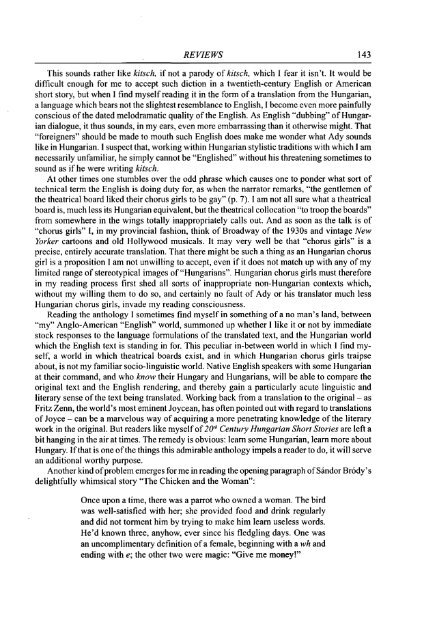
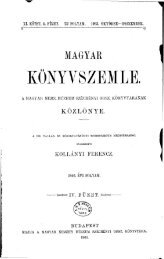
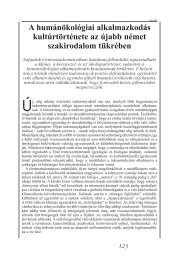
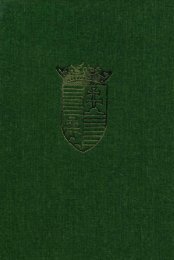
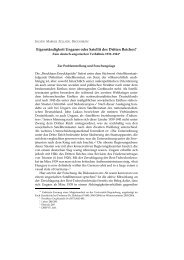
![Letöltés egy fájlban [36.8 MB - PDF] - EPA](https://img.yumpu.com/23369116/1/172x260/letoltes-egy-fajlban-368-mb-pdf-epa.jpg?quality=85)
